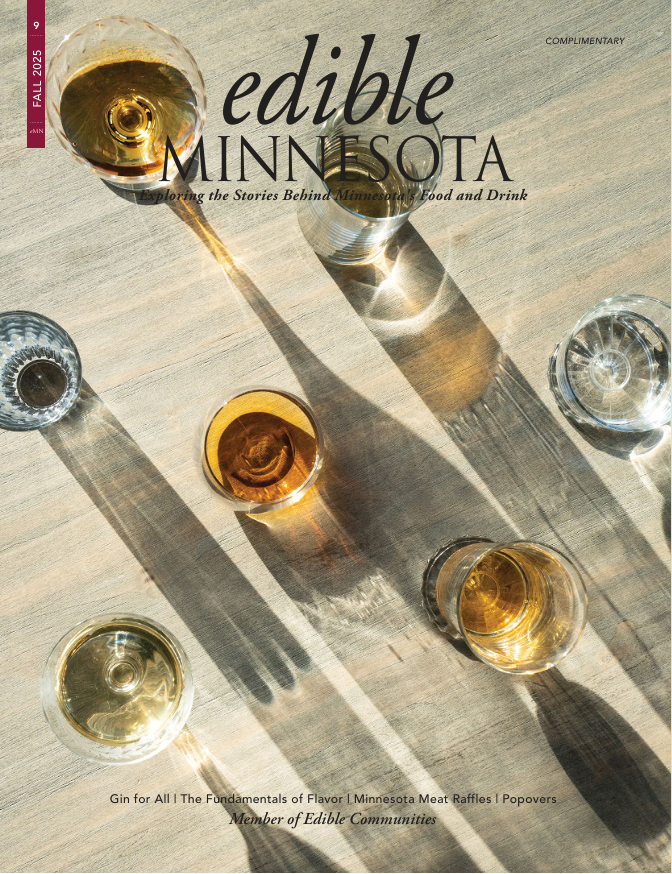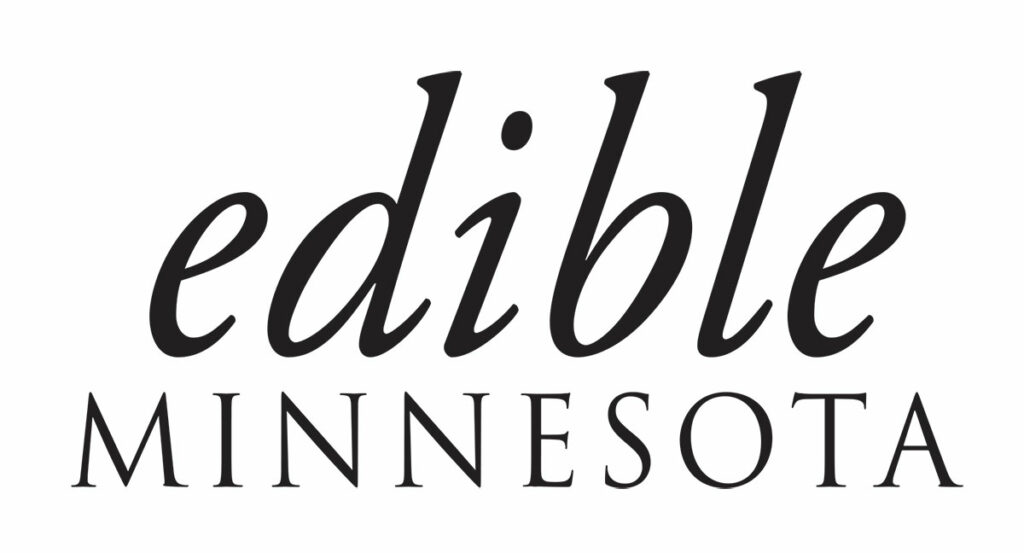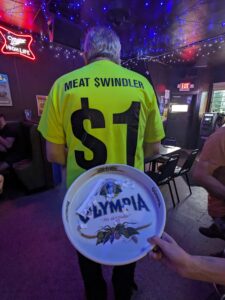The Draw of the Minnesota Meat Raffle
By Nora Dummer
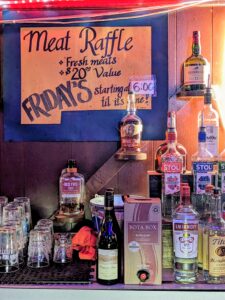
It wasn’t until my third meat raffle of the week when I finally got lucky.
“Number two!” Kim called out from her post at the wheel, the number matching the ticket in my hand.
“That’s me!” I yelped. I’d shown up alone to the Knight Cap in Northeast Minneapolis for their Saturday noon raffle, though it didn’t take long for me to feel like I was among friends. I approached the table and eyed all of the offerings – bratwurst, sirloin, bacon-wrapped chicken, chuck roast and more from Hackenmeuller Meats were on display under the glow of the television. I grabbed a couple of sirloins and headed back to my seat. A minute later, the bartender called out the ticket number that I got just for showing up.
“That’s me!” I uttered, a little more sheepishly this time, claiming my free drink.
“Looks like you’re going to write a good story,” said the couple to my left.
Tell someone from out of state that you’re going to a meat raffle and the words you’ll hear in response, inevitably, are “A what raffle? Meat? M-E-A-T?” as if those two words have never, and should never, share a sentence.
Though the uninitiated will want you to explain what a meat raffle is, the description really is right there in the title. In short: It’s a raffle to win meat. In long, it’s a form of gambling held at a fraternal or veterans club, church, bar or restaurant. For a buck you get a ticket with a number on it between one and thirty that’s good for the round. The host spins the state-sanctioned paddle wheel and if it lands on your number, you get to pick out a package or two of raw meat provided by the local butcher. Each raffle includes between five and thirty spins depending on how much meat there is, how quickly customers buy tickets, and how swiftly the host moves from table to table. If there’s more demand to gamble after the meat is gone, there are gift certificates to local businesses or free drinks to win to keep customers pulling out their ones. Proceeds go to charity, blurring the line between philanthropist and bar fly.
Meat raffles are not strictly Minnesotan, though we have hungrily embraced the practice more than just about any other place in the world. They are rumored to have started in the UK after World War II for the purpose of rationing and sharing meat and came over to the states shortly after. Australia has them, too, called chook raffles (chook referring to a whole chicken that is usually processed by a butcher, though occasionally you’ll walk with a live bird). Both Wisconsin and western New York have bustling scenes; across the country, bars are slowly adopting the tradition as they seek novel ways to fill stools amidst the decline of happy hour culture. Even Minnesotans are looking to innovate – Grumpy’s in Northeast hosts T-Bone Bingo and The Herbivorious Butcher, a vegan butcher shop, supplies their “meat” to raffles with proceeds going to an animal sanctuary. The Minnesota Meat Raffle Map online shows over 300 across the state and meatraffle.com lists an average of about twenty a day. In the Northeast neighborhood of Minneapolis alone, there are at least ten throughout the week, the majority benefitting the Northeast Lion’s Club. Just three butcher shops supply the whole of the Twin Cities – Everetts, Hackenmeullers, and Ready Meats – all of which have been family run for over 70 years.
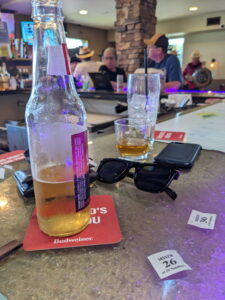
Meat raffles are so popular in Minnesota largely in part to the state’s longstanding tradition of charitable gambling. The industry – including bingo, pulltabs and tipboards – is the largest in the country, grossing nearly 4.9 billion dollars in 2024 (a 9% increase from the previous year). Though bingo was legalized in 1945, raffles didn’t get greenlit for another forty years and have steadily gained in popularity ever since. In fact, the only gambling habit that did not take a hit during the Great Recession of 2007 was meat raffles.
Of course, there’s a more obvious answer as to why meat raffles are popular.
“The meat!” the gentleman to my right exhaled when I asked him why he likes coming. A resident of Northeast for 54 years, he told me that back in the day he used to hit four in a row on a Saturday between here and New Brighton. “You were lucky if you made it out of the last one,” he grinned.
As we chatted, I couldn’t help but watch the host make her rounds. Kim Cousins, known familiarly as “the meat wench”, flitted around the bar giving out nicknames and taking in dollars, razzing the regulars with a wink and a smile. It took her exactly one spin of the wheel to tear a new batch of paddlewheel tickets to fill her basket for the next round.
“No one does my numbers,” she told me later with a smirk; it’s true – with 25 spins in under two hours, her speed is unmatched. She’s spun at the Knight Cap for 16 years, long enough to have a devout following that will buy extra tickets on a slow day or drive in from Wisconsin just to see her. “All these years of doing it and I’m still not mad about it. I like the people and they take care of me; it’s just fun!”
Tim Bohmer shares the sentiment. He attended meat raffles for 40 years before becoming a host six years ago at various places around Northeast.
“There’s lots of regulars, a good clientele; the crowd that’s here is family,” he told me after the raffle at Dusty’s Bar on a Friday night. Tim started selling greeting cards at five years old and has been in sales ever since; if there’s one thing he knows, it’s how to drop a one liner and work a room. The winners of this particular raffle are celebrated with a barrage of chants and congruous claps led by Tim: “Meat! Meat! Meat! Meat!” or if it’s your first time at a raffle: “Virgin Meat! Virgin Meat!” (If you’re lucky enough to win two or three times in a night, the chanting gets a bit more vulgar.) He asserts that it adds to the communal feel and sets it apart from the others. He’s right; the chanting is infectious.
The hosts, Wes Glenna and Jeremy Olson, at Jake’s On the Lakes have a different approach to make their raffle unique. Walking through the doors of the restaurant in Center City, I searched for an empty seat at the bar in a sea of regulars in cowboy hats. (The hats, I later learned, will earn you a free drink.) Marty Robins crooned over the stereo; Wes donned a fringed crushed velvet maroon top. When he called the winning number, a “yee-haw!” bellowed out from the crowd, the expression a prerequisite for picking out a package provided by Deutschland Meats of Lindström. “When we started the raffle a couple of years ago, we got a little bored of it quickly. Then we turned it into the “Super Terrific Cowboy Meat Raffle”. Now it’s a lot more fun.”
Ask someone from in state why they like coming to a meat raffle and their answer, inevitably, is meat. But the real answer, I suspect, is a lot deeper than that. From the charity that organizes it, to the venue that holds it, to the butcher that donates to it, to the host that spins it and to the customers that pay for it, the event necessitates community. It brings people together to wear cowboy hats, to chant, to inherit a provisional nickname like “meatless wonder”. It’s dinner and a show serving competitiveness and camaraderie in turn. Of course, if you’re lucky, the sirloins are nice, too.
Nora Dummer is a chef and cooking class instructor who’s recently returned to Minnesota after a long, soggy stint in Seattle. In the rare moments of relief from chasing around her two young children, she is busy building her all-things-food-business, for the love of cuts and burns.
